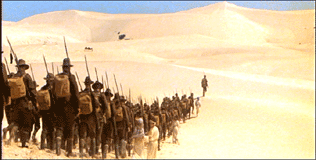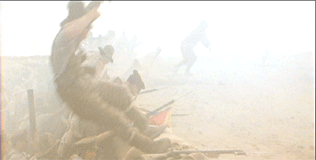|
Newest Reviews:
New Movies -
The Tunnel
V/H/S
The Tall Man
Mama Africa
Detention
Brake
Ted
Tomboy
Brownian Movement
Last Ride
[Rec]³: Genesis
Hara-Kiri: Death of a Samurai
Indie Game: The Movie
Abraham Lincoln: Vampire Hunter
Old Movies -
Touki Bouki: The Journey of the Hyena
Drums Along the Mohawk
The Chase
The Heiress
Show
People
The Strange Affair of Uncle Harry
Pitfall
Driftwood
Miracle Mile
The Great Flamarion
Dark Habits
Archives -
Recap: 2000,
2001, 2002,
2003, 2004
, 2005, 2006,
2007 , 2008
, 2009 ,
2010 , 2011 ,
2012
All reviews alphabetically
All reviews by star rating
All reviews by release year
Masterpieces
Screening Log
Links
FAQ
E-mail me
HOME
| |
Gallipoli (Peter Weir) 1981
 Peter Weir's films manage to meld commercial concepts with an art house vibe
better than nearly any other director. His movies, as a result, tend to feel like
they are somewhat at odds with themselves, and possibly none of his works feels more
conflicted than his Gallipoli. In Gallipoli, Mel Gibson and
Mark Lee portray two young Australians that join the ill-fated ANZAC expedition
to Turkey in 1915. A great deal of time is spent establishing the lives of these
two characters before they join the armed forces. The men don't enlist until the
film's halfway mark. Only about a quarter of the film finds the men actually on
the site of the battle. He's attempting to show that these men had lives before the
slaughter at the end of the film cut them short, an attempt to bring art-house
characterizations to the war film, but it also shortchanges the
battle sequence's power and the historical context in which it took place. The
film chooses to show us scenes out of a road movie as the two leads, who are
naturally opposites, travel across the picaresque country. There's a noticeable
lack of substantial development for any of the characters beyond Lee's, and
even his character's background feels contrived. If this is an attempt to tell
one soldier's story, perhaps Weir should have focused on a more interesting
individual. The film's visual and textual
simplicity, which feels as if it was intentional (presumably to make the tale
universal), begins to work against it. Gibson's character resists the idea of
joining the Army, while Lee's breaks rules in order to be allowed. Most of the
soldiers seem motivated only by the media's propaganda, and the film's
performances do little to help. When the film's antiwar message kicks in, you
wish you knew something more about the soldiers. You're uncertain if you've just
witnessed bravery, brainwashing, or both. You wished you had something more to
mourn, and it's odd that you don't considering how much running time is spent
trying to establish the characters.
Peter Weir's films manage to meld commercial concepts with an art house vibe
better than nearly any other director. His movies, as a result, tend to feel like
they are somewhat at odds with themselves, and possibly none of his works feels more
conflicted than his Gallipoli. In Gallipoli, Mel Gibson and
Mark Lee portray two young Australians that join the ill-fated ANZAC expedition
to Turkey in 1915. A great deal of time is spent establishing the lives of these
two characters before they join the armed forces. The men don't enlist until the
film's halfway mark. Only about a quarter of the film finds the men actually on
the site of the battle. He's attempting to show that these men had lives before the
slaughter at the end of the film cut them short, an attempt to bring art-house
characterizations to the war film, but it also shortchanges the
battle sequence's power and the historical context in which it took place. The
film chooses to show us scenes out of a road movie as the two leads, who are
naturally opposites, travel across the picaresque country. There's a noticeable
lack of substantial development for any of the characters beyond Lee's, and
even his character's background feels contrived. If this is an attempt to tell
one soldier's story, perhaps Weir should have focused on a more interesting
individual. The film's visual and textual
simplicity, which feels as if it was intentional (presumably to make the tale
universal), begins to work against it. Gibson's character resists the idea of
joining the Army, while Lee's breaks rules in order to be allowed. Most of the
soldiers seem motivated only by the media's propaganda, and the film's
performances do little to help. When the film's antiwar message kicks in, you
wish you knew something more about the soldiers. You're uncertain if you've just
witnessed bravery, brainwashing, or both. You wished you had something more to
mourn, and it's odd that you don't considering how much running time is spent
trying to establish the characters.
 Despite the personality that would allow the film to reach a higher level of
emotional resonance, the film's message does come across clearly. War has rarely
felt more nonsensical in film than it does here. The battle scenes, without much
gore or even much action, manage to convey a disturbing sense that combat is a confusing
horror, and that's an achievement, since we don't really understand the context
of the attack. This achievement seems largely accountable to the excellent cinematography and the
solid direction. The new-age synth-heavy score, however, is jarring and
inappropriate. One does leave the film wishing there was a bit more explanation
of the tactical objective of the skirmish, so the loss of life could be justified
somehow. The film doesn't allow us that, though, steadfastly damning everyone
involved except for its protagonist. It railroads us into a
response, and, despite, or maybe because of the obvious craft at work, left me
feeling a bit used.
Despite the personality that would allow the film to reach a higher level of
emotional resonance, the film's message does come across clearly. War has rarely
felt more nonsensical in film than it does here. The battle scenes, without much
gore or even much action, manage to convey a disturbing sense that combat is a confusing
horror, and that's an achievement, since we don't really understand the context
of the attack. This achievement seems largely accountable to the excellent cinematography and the
solid direction. The new-age synth-heavy score, however, is jarring and
inappropriate. One does leave the film wishing there was a bit more explanation
of the tactical objective of the skirmish, so the loss of life could be justified
somehow. The film doesn't allow us that, though, steadfastly damning everyone
involved except for its protagonist. It railroads us into a
response, and, despite, or maybe because of the obvious craft at work, left me
feeling a bit used.
* * *
October, 2001
Jeremy Heilman
|